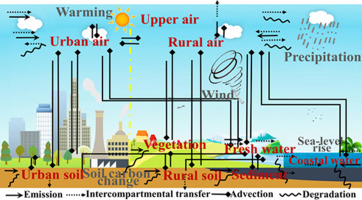当前位置:
X-MOL 学术
›
Sci. Total Environ.
›
论文详情
Our official English website, www.x-mol.net, welcomes your feedback! (Note: you will need to create a separate account there.)
Potential effects of changes in climate and emissions on distribution and fate of perfluorooctane sulfonate in the Bohai Rim, China
Science of the Total Environment ( IF 9.8 ) Pub Date : 2017-09-14 , DOI: 10.1016/j.scitotenv.2017.09.021 Chao Su , Shuai Song , Yonglong Lu , Shijie Liu , John P. Giesy , Deliang Chen , Alan Jenkins , Andrew J. Sweetman , Baninla Yvette
Science of the Total Environment ( IF 9.8 ) Pub Date : 2017-09-14 , DOI: 10.1016/j.scitotenv.2017.09.021 Chao Su , Shuai Song , Yonglong Lu , Shijie Liu , John P. Giesy , Deliang Chen , Alan Jenkins , Andrew J. Sweetman , Baninla Yvette

|
Climate change and emissions rates of contaminants are expected to affect distribution and fate of Persistent Organic Pollutants (POPs) in the environment, however, studies on these combined factors are rare. In this study, Perfluorooctane Sulfonate (PFOS) is used as an example to assess how those two factors synthetically affect fate and disposition of POPs in the Bohai Rim of China by using the Berkeley-Trent-Urban-Rural (BETR-Urban-Rural) model. We set up three climate change scenarios and four emission scenarios to conduct the simulations. The results show that climate change could have significant effects on the transport and fate of PFOS mainly including advection, inter-compartmental transfer under the “worst case” emission scenario. For most grids, a remarkable decrease in concentrations of PFOS are predicted for fresh water and urban soil in the future, with precipitation and temperature being predominant factors, whilst for coastal water and rural soil, an increasing trend is predicted. Additionally, predicted sum of sources to the Bohai Sea increases greater than removals from the Bohai Sea in the future, adding evidence that concentrations of PFOS in coastal water will increase more in the future. Under scenarios of reduced emissions and climate change, concentrations of PFOS in each compartment decreased more rapidly over time. We suggest that assessment of future climate change impacts on fate of PFOS could take emission reductions into consideration.
更新日期:2017-09-15



























 京公网安备 11010802027423号
京公网安备 11010802027423号